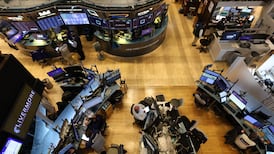Global equity prices slipped and investors flocked to safe-haven assets on Tuesday after North Korea fired a missile over northern Japan, fuelling fresh tension between Washington and Pyongyang.
US stocks were unchanged by late-morning trading after recovering well from session lows as investors assessed US president Donald Trump’s response.
European stocks, however, tumbled to a six-month low due to the strife and also currency worries, while the Iseq in Dublin fell 1.4 per cent.
DUBLIN
The Irish exchange’s global heavyweights with big positions in the US market performed poorly, as geopolitics sent investors running for cover.
CRH, the building materials giant, finished the session down 1.8 per cent at €28.48. Dairy company Glanbia, which has invested heavily in its US performance nutrition and energy snacks business, finished down 3.2 per cent. Kerry Group was down almost 1 per cent, while paper giant Smurfit Kappa was down more than 2.2 per cent.
Travel software company Datalex, which is backed by Dermot Desmond, was one of the few bright spots of the day's trading. It finished up more than 1 per cent after posting interim earnings up 17 per cent, and said it is in "advanced discussions" for deals with major global airlines.
LONDON
Precious metal miners were among the biggest risers as investors sought out safe havens. Miner Fresnillo rose 2.5 per cent, or 41p to 1,621p, while Randgold Resources climbed 4.5 per cent or 345p to 7,915p.
Outsourcing firm Bunzl was also down despite profits rising sharply in the first half of the year as it reaped the rewards of growth in the US. Shares were off 49p to 2,283p as the group posted a 20 per cent rise in revenue to £4.1 billion and pre-tax profit increased 17 per cent to £181.9 million in the six months to June 30th.
Bunzl has been buoyed by a string of acquisitions in North America, where it books the vast majority of its revenue, and the Brexit-induced sterling collapse.
The biggest risers on the FTSE were Randgold and Fresnillo, Anglo American up 14p to 1,353.5p, and Associated British Foods up 32p to 3,216p. The biggest fallers were ITV down 7.9p to 153p, and Morrison's down 9.3p to 242.1p.
EUROPE
Compounding the mood for European investors, the region’s currency rose above $1.20 for the first time in more than two years, a level that fund managers and strategists call the “pain threshold” at which it dampens earnings.
Germany’s exporter-heavy DAX Index fell 1.5 per cent, among the worst developed-market performers.
German commercial broadcaster Prosiebensat fell 14.5 per cent after flagging a weaker outlook for advertising in the third quarter, the third cut in advertising guidance this year, according to Deutsche Bank analysts.
RTL Group dropped 5 per cent, while Spanish broadcasters Mediaset Espana fell 7 per cent. The media sector is the second worst-performing in Europe this year.
Lundin Petroleum sank 6.5 per cent after its Korpfjell prospect, a joint venture with Statoil in the Barents Sea, found no oil and only non-commercial quantities of natural gas.
NEW YORK
The dollar index, which measures the greenback against a basket of six major currencies, was 0.29 lower at 91.943, after hitting 91.621, its lowest since mid-January 2015.
Nine of the 11 major S&P sectors were lower, with the financial and materials sectors leading the decliners.
Dow component Nike fell 2.3 per cent after Morgan Stanley cut its price target by $4 to $64.
Best Buy tumbled 9 per cent after the number one US consumer electronics retailer warned that its strong quarterly same-store sales performance should not be seen as a "new normal". The stock was the biggest percentage loser on the S&P.
– (Additional reporting: Bloomberg/Reuters/PA)
















